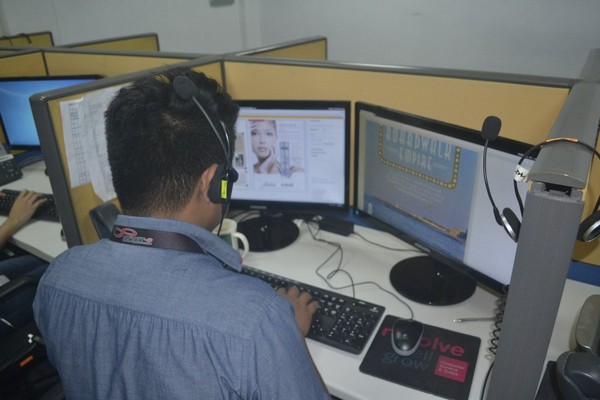
The Department of Trade and Industry is partnering with a technology company to train business process outsourcing workers on the use of Augmented Intelligence to help them keep their jobs amid the AI threat. / INQUIRER FILE PHOTO
Artificial intelligence (AI) battling artificial intelligence may sound like a science-fiction movie, but for the Philippine government, it is a way to save thousands of Filipinos from being jobless.
It is known that several information technology and business process outsourcing (IT-BPO) companies are looking to cut expenses by replacing its workforce with AI.
However, the Department of Trade and Industry (DTI) decided to use AI–the same technology–to keep Filipino BPO workers in their offices.
With the help of the Department of Information and Communications Technology (DICT) and tech company AI Pros, DTI will train workers on the use of Augmented Intelligence (AI2).
“Instead of AI replacing jobs in the IT-BPO industry, which is estimated to affect half of the 1.3 million jobs in the sector, the workers will be trained to make use of AI2-enabled systems,” DTI Secretary Ramon Lopez said in a statement on Thursday.
“Basically, it’s making the AI system become the solution to the problem,” Lopez said.
In technology parlance, augmented intelligence refers to the use of information technology to enhance human intelligence.
“We are the first country to launch this kind of initiative. Instead of looking at AI as a threat to the BPO industry, the Duterte administration is using AI2 to provide more opportunities for inclusive growth,” Lopez said.
“This initiative, summed up under the “Philippine AI Workforce” brand campaign, will provide more jobs to Filipinos and bring the development to rural communities,” Acting DICT Secretary Eliseo Rio added.
According to DTI, the introduction of AI2 to the Philippines BPO sector will improve the competencies of BPO workers. The training is projected to enable 482,000 unskilled workers to handle low-skilled work, 525,000 low-skilled workers to do mid-skilled work, and 309 mid-skilled workers to participate in high-level tasks.
“We will train and enable our workforce, regardless of their background and experience, to use AI2 to perform smarter and complete difficult tasks, and help them move up the value chain,” Lopez said.
Lopez added that the training was not only aimed at existing BPO workers but ordinary people who might not have considered working with the IT-BPO industry.
“The idea here is to empower not only the existing BPO workers but also involve those at the rural areas,” Lopez said.
“The training will make them employable, operating even in the rural areas to make this program truly inclusive,” he added.